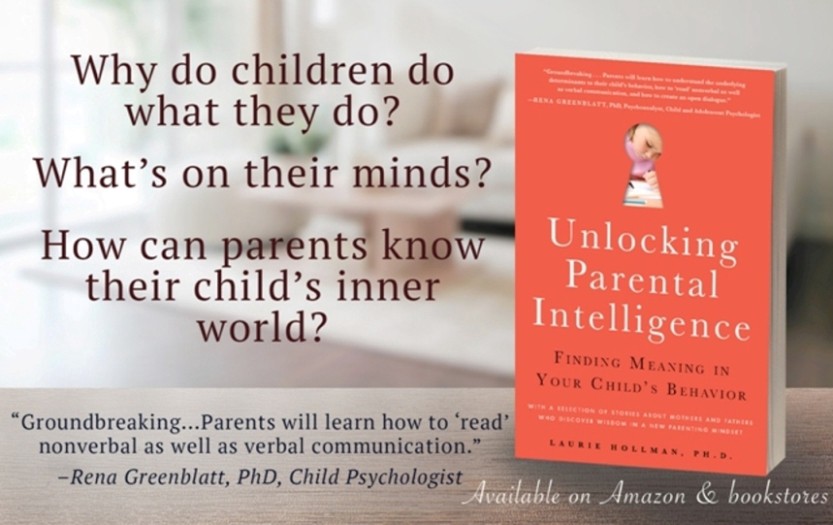Why do children and teens do what they do? What’s on their minds? How can parents know their child’s inner world? These are the questions to ask when faced with unsolvable problems and kids’ behaviors that puzzle and distress you. Imagine a three- or fifteen-year-old with who slams doors, yells and screams while running around without direction. Imagine this isn’t typical and you’re baffled. No parents know how to handle this because they don’t know what it means. Now there’s a way to figure out this behavior, understand it and solve it. Use your Parental Intelligence by becoming a “meaning-maker.” Here’s how:
Five Steps to Unlocking Parental Intelligence
1. Stepping Back
Consider the idea that there’s no bad behavior, just distressing behavior. This changes your outlook. Think back to the pattern of the behavior that’s puzzling you. How often does it occur and when? Are there triggers that set your child off? Stepping back is counter-intuitive. It means taking no action immediately. How can you establish consequences when you don’t yet understand the behavior? Behavior has meaning; it’s a communication when the child or teen doesn’t have the words to say what’s troubling them. Sit back, pause, don’t blame yourself or your child, just contemplate and you will find yourself and your child calming down. You’ve begun the process of looking for meaning behind the behavior.
2. Self-Reflecting
Self-Reflecting entails thinking about your feelings, your reactions to the situation. You will find your feelings about your child’s action lead you to consider his or her feelings as well. Your feelings may be a clue to how your child feels. Self-reflecting leads you to naturally search for meaning behind the behavior as you find yourself asking questions like: What might have made my child so angry and irritable? Where did all this excess energy come from? What is he trying to tell me? I feel helpless, maybe she does too, but what helpless about what?
3. Understanding Your Child’s Mind
This is the crux of using Parental Intelligence. It’s time for a quiet conversation. The louder your child maybe, the quieter your tone should be. Be an attentive listener who does not interrupt. Listen for your child’s thoughts, opinions, intentions, imaginings, and beliefs. You may be surprised to learn that he just failed a major exam, or lost a friendship, or was scolded by a teacher. Whatever it is you are discovering the meaning behind his rash, impulsive behavior. You discover you don’t have to even address the behavior because it vanishes when the child feels understood. Now you’re learning the meaning behind the behavior and begin thinking of how to give your child other coping skills as well as empathize with his upset.
4. Understanding Your Child’s Development
If your child has a precocious ability or disability you learn what is reasonable to expect. This is essential because if you expect a potential that’s different from what your child is capable of his self-esteem will be very rocky, he won’t feel understood or be in the mood to solve his dilemma. Let’s say her boyfriend broke up with her after three months of feeling really close. Now you know she’s heart-broken but maybe she is missing essential social skills of really making a commitment. After you empathize, you now begin to think of what you can teach her to help her socialize more effectively or maybe she does have great social skills and needs to learn to tolerate deep disappointment. You have your work cut out for you, but at least you have direction.
5. Problem Solving
Now that you have found the underlying reasons for the behavior, problem solving is so much easier. Your child or teen feels so much less alone because they feel understood by their trusted parent. Perhaps you share with them the way to tolerate sadness and disappointment and frustration if it was a break-up. Perhaps you give them more study skills or a tutor for the failed exam. Perhaps you discuss together on how to collaborate with the scolding teacher. Whatever the problem, it’s now defined. The problem was never the slamming of doors. That was the symptom of an overarching situation that you have discovered with your child.
The upshot is you have strengthened your child/teen-parent relationship significantly. Your child knows you can be trusted and will listen to their problems, trust their future judgments, and have faith in your partnership together. Your child will be grateful to you for really authentically being there and you will have unlocked your parental intelligence.
Laurie Hollman, Ph.D., is a psychoanalyst and author of Unlocking Parental Intelligence: Finding Meaning in Your Child’s Behavior found on Amazon, Barenes & Noble, Familius and wherever books are sold. Visit her at http://lauriehollmanphd.com
Originally published at medium.com


